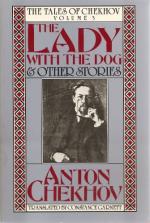|
This section contains 8,228 words (approx. 28 pages at 300 words per page) |

|
SOURCE: "Principles of Structure in Chekhov's Plays," in Chekhov: A Collection of Critical Essays, edited by Robert Louis Jackson, Prentice-Hall, 1967, pp. 69-87.
The following is an abridged version of an essay that was first published in Russian in 1948. Skaftymov addresses the "question of the unity of form and content" in Chekhov's plays.
There is a rather large and in many respects substantial body of secondary literature on Chekhov's dramaturgy.
Contemporaries noted a peculiarity in Chekhov's plays at the time of the first productions. At first they interpreted this peculiarity as Chekhov's inability to manage the problems of continuous living dramatic movement. Reviewers spoke of "prolixity," of the lack of "stage-craft," of "insufficient action" and weakness of plot. In reproaching Chekhov, contemporaries wrote that "he himself does not know what he wants," that "he does not know the laws of drama," that, he does not fulfill the "most elementary...
|
This section contains 8,228 words (approx. 28 pages at 300 words per page) |

|


